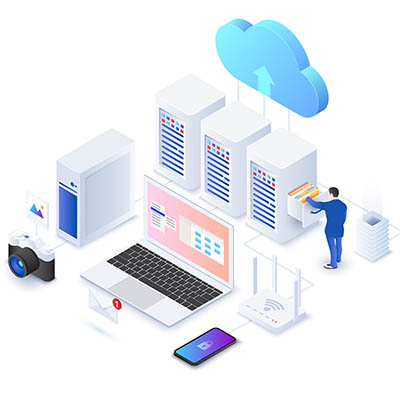There are certain unspoken rules of doing business, one of which is that technology allows for innovation in various capacities to the point of making older, more traditional ways of doing business obsolete. If you properly use technology, you can improve your business’ operations. Let’s look at three ways technology drives innovation in the business world.
Selecting the right servers for your business is extremely important and can either promote optimal performance, reliability, and security of your business computing; or it can present nothing but problems. Today, we will go through six tips to help you make good decisions about servers for your business.
Technology is constantly evolving, but over the past couple of years, if you thought of yourself as being technologically savvy, you would have a pretty good understanding of the technologies that are trending in society. Let’s take a brief look at five technologies that everyone should have a good grasp on.
The cloud is an amazing tool for just about any business, allowing for countless benefits that span endless possibilities. However, because it involves the Internet and hosting data in an online environment, there are security challenges that naturally come about as a result of utilizing it. Let’s consider some of the security mistakes that businesses can experience while using the cloud.
We have not been shy about expounding upon the benefits of the cloud for businesses, as these benefits are both considerable and accessible. That being said, not even the cloud is completely perfect, and there are security errors that can easily be made. Let’s go through these security errors to see if any sound familiar to your situation. Missing Access Controls and No Multi-Factor Authentication Here’s the thing: if your cloud resources are open to anyone, nothing in them can be considered secure. This is why proper access controls—ideally supported by multi-factor authentication—are so important to have. The data and processes that the cloud can help you support are valuable to your business. Frankly, they’re critical. Leaving them exposed thereby puts your business at risk. Implementing access controls to limit access to your cloud resources to only the team members that actively need them is therefore necessary—and this access should also require multi-factor authentication requirements (identify authentication measures that go beyond just the username and password combination) to be met before it is granted. You Have No Backups Today’s businesses have various options available to them, in terms of how they put the cloud to use. Many will elect to utilize public cloud resources that are maintained and managed by an external provider, many will host and maintain their own cloud infrastructure within their business, and many will use a hybrid model that incorporates both for different purposes. Regardless of the type of cloud you use, it is important that you don’t put all your eggs in one basket. Remember, the cloud is just another server that you are able to access remotely. What if something were to happen to the cloud infrastructure you were relying on? This is precisely why it is important that you have backups for all of your cloud data—especially for that which you use a private, self-hosted cloud to store. And while it is true that most reputable cloud providers will actively store your data in numerous physical locations as a form of protective redundancy, it is always best to get this in writing in case the worst winds up happening. Cloud Data is Left Unencrypted Of course, backups are just one element of keeping your data safe. Again, while most public cloud providers are relatively very secure, data leaks and theft are not unheard of. Furthermore, data needs to travel back and forth between the user’s endpoint device and the cloud infrastructure, giving an enterprising cybercriminal the chance to take a peek while said data is in transit. In this context, avoiding a breach will require you to keep your cloud data encrypted, which scrambles it to anyone who tries viewing it without the proper decryption key. This measure is actually required by many regulations that businesses of assorted kinds must abide by, including the Payment Card Industry Data Security Standard (PCI DSS) and the UK’s General Data Protection Regulation (GDPR), making noncompliance a direct detriment to your business in general. We Can Help You Ensure Your Use of the Cloud is Secure, While Remaining Beneficial to Your Business In fact, we can say the same for all of your business’ critical technology. Here to provide Greensboro with the best that the managed services model of technology support has to offer, we’re hoping to […]
Whether we want to admit it or not, the future can be scary, and even the most powerful technology out there is not enough to keep today’s data preserved while it’s in storage. Decades from now, or perhaps even a century, are you confident that your data will be available and ready to use? We’re here today to discuss why you shouldn’t be extremely confident in your hard drives.
Managing your technology infrastructure can be challenging, but virtualized computing presents an opportunity for you to make considerable changes and progress to a more efficient way of doing so. With the right technology and the right solutions, you can break through barriers previously in place and do some remarkable things with virtualized technology.
Software is extremely important for businesses, so when you are creating the strategy and roster of applications you plan to use, you need to be smart about it. One way you can make the most out of your technology budget is to consider Software-as-a-Service (SaaS). With SaaS, your business can get the digital assets it needs at a price you can afford. Let’s discuss what makes SaaS so valuable for businesses.
The cloud has been a good resource for business for quite a while. Just how good? Currently, nine-out-of-ten businesses operate with some type of cloud-hosted solution. In fact, by the figures, we’re definitely looking at a cloud-hosted future. We thought it would be interesting to take a look at some of the cloud computing stats and trends to paint a picture of just how the cloud has grown up.
Productivity suites are a dime a dozen, with Microsoft Office being perhaps the most well-known. However, there are plenty of other options out there, such as Google Workspace. How does Google Workspace hold up as a solution for productivity compared to its competition? Let’s take a look!









